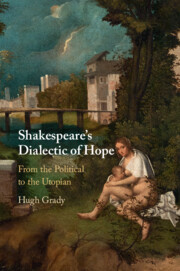Book contents
- Shakespeare’s Dialectic of Hope
- Shakespeare’s Dialectic of Hope
- Copyright page
- Dedication
- Contents
- Acknowledgments
- Part I
- Part II
- Introduction to Part II Shakespeare and the Aesthetic-Utopian
- Chapter 4 From the Political to the Aesthetic-Utopian in Antony and Cleopatra
- Chapter 5 Tyranny, Imagination, and the Aesthetic-Utopian in The Winter’s Tale
- Chapter 6 The Political, the Aesthetic, and the Utopian in The Tempest
- Bibliography
- Index
Chapter 4 - From the Political to the Aesthetic-Utopian in Antony and Cleopatra
from Part II
Published online by Cambridge University Press: 02 June 2022
- Shakespeare’s Dialectic of Hope
- Shakespeare’s Dialectic of Hope
- Copyright page
- Dedication
- Contents
- Acknowledgments
- Part I
- Part II
- Introduction to Part II Shakespeare and the Aesthetic-Utopian
- Chapter 4 From the Political to the Aesthetic-Utopian in Antony and Cleopatra
- Chapter 5 Tyranny, Imagination, and the Aesthetic-Utopian in The Winter’s Tale
- Chapter 6 The Political, the Aesthetic, and the Utopian in The Tempest
- Bibliography
- Index
Summary
Chapter 4 on Antony and Cleopatra again investigates the dynamics of power, but this time in a dialectic with erotic pleasure as well as with nature. The play’s paradoxically triumphant suicides at the end contain strong utopian resonances affirmative of eros and its links with death and the aesthetic. This play represents the turning point in the development this book is charting, as Shakespeare’s works take on new forms and themes that emphasize the utopian overcoming power in plays that are tragicomic and synthetic of his career. The chapter also analyzes Egypt as containing, along with its political practices, a Shakespearean green world quality, linking the play to earlier green world comedies. Egypt is especially an erotic, feminized, and feminist utopian space housing the play’s counter-political values. Cleopatra emerges as both a political and a utopian character and one who becomes at the very end the play’s dominant figure. Her partner Antony, of course, is essential to the play as well and eventually develops his own utopian qualities after seeming at first a love-sick buffoon, then an instrumental, ruthless politician. The play is formally a tragedy but has a strong tragicomic feeling as well.
- Type
- Chapter
- Information
- Shakespeare's Dialectic of HopeFrom the Political to the Utopian, pp. 111 - 150Publisher: Cambridge University PressPrint publication year: 2022

